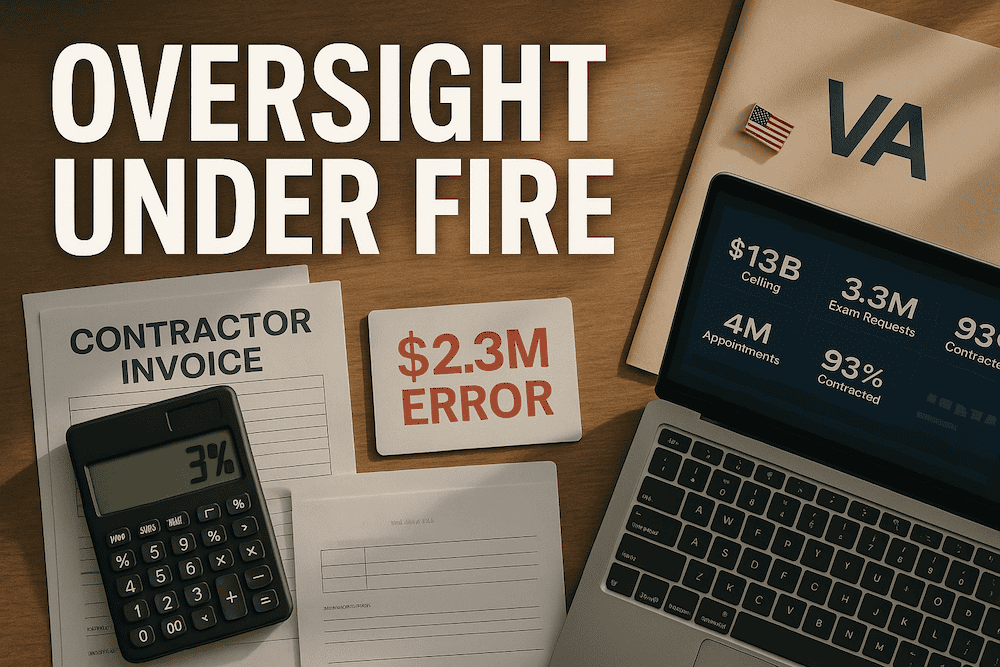When examiners don’t get veterans’ records, bad decisions aren’t a mistake—they’re a systemic failure.
In a blistering oversight hearing this week, members of Congress openly questioned whether the VA’s contracted medical examination system has become so dysfunctional that examiners may be conducting—and billing for—exams without the full evidence required. Several lawmakers drew attention to behavior that edges disturbingly close to False Claims Act (FCA) territory.
At the heart of the problem is testimony showing that contracted examiners are often not receiving the full claims file, despite VA leadership insisting otherwise. That missing evidence has led to flawed DBQs, incorrect denials, and potentially millions in improper incentive payments.
“This is a systemic breakdown”
Rep. Mark Greenman McGarvey (Ranking Member) did not mince words:
“This is a massive program… and we’re hearing way too many stories of how it’s not working for our veterans.”
He went further, describing the system as one where vendors are rewarded despite poor performance, noting that the Government Accountability Office (GAO) reported $2.3 million in incorrect incentive pay delivered to contractors.
Rep. Morgan McGarvey later underscored the ethical danger:
“If the contracted provider gets the paperwork right and they get it in, they’ll get their incentive pay… Is this the standard of care that our veterans should experience or that we want to incentivize?”
When you combine this with GAO findings that contractors often lack direct oversight, it becomes clear—Congress sees a system ripe for abuse, and potentially intentional misuse.
Exams in hotel rooms? Yes—really.
The moment that captured national attention came when Rep. McGarvey described an actual case:
“Think about the veteran who’s transitioning to civilian life, showing up to a compensation exam for military sexual trauma and walking into a hotel room for their exam. This might sound far-fetched… but it’s happened.”
The room erupted—not in surprise, but in grim recognition.
That shocking scenario underscores the deeper problem: if the environment is unprofessional, the exam will be unprofessional. And if the examiner never received the full evidence? Veterans are denied based on an incomplete review—a textbook example of a potentially false claim submitted to the government.
GAO: Exam quality oversight has failed
Elizabeth Curta from GAO delivered devastating findings:
“VBA overpaid almost $2,300,000 in financial incentives… and none of the five recommendations for improvement have been fully implemented.”
GAO also found examiners themselves are not being listened to:
“Five of the six examiners we interviewed said they wanted the opportunity to provide feedback directly… All six said unaddressed concerns made it harder to provide high-quality exams.”
This means the people performing the exams—those who actually see the evidence gaps, missing medical records, and unclear instructions—have been effectively silenced.
VA’s claim: “They get the entire file.” Congress: “No, they don’t.”
When Rep. Dr. Rich McCormick asked MDEO Deputy Director Mary Glenn whether the examiners receive everything:
Glenn: “If it’s in the veteran’s claim folder, everything is sent over.”
But this contradicted both GAO’s findings and sworn statements from examiners.
Congress quickly pounced.
Rep. Greenman asked the key question:
“How do you establish trends if you’re not accepting feedback from your examiners?”
No clear answer followed.
Congress is now openly concerned the system is fraudulent
When examiners perform exams:
- without a complete claims file
- in improper settings
- using inconsistent DBQ guidance
- without required training
- and the vendor gets paid anyway
…that’s not just bad administration.
That’s potentially an FCA violation.
And Congress knows it.
Veterans need to push back—hard
When a VA examiner conducts an exam without your full evidence, performs it in an unprofessional setting, or refuses to acknowledge medical facts already in your record, you must take action.
File a Congressional Inquiry.
Congress is clearly signaling they want—and need—more evidence from veterans on the ground.
Every inquiry exposes:
- missing evidence
- exam errors
- improper examiner conduct
- inadequate oversight
- contractor failures
- systemic bias
These inquiries build the record Congress now uses to fix the system.
If you had a bad examiner, Get Help.
If you experienced exam misconduct or believe a contractor cut corners on your claim, DisabledVeterans.org does not accept these reports directly. Veterans who want a safe place to document what happened often contact Krause Law for more information:
You can reach me directly here:
👉 https://www.benjaminkrauselaw.com/veterans-disability-attorney/

